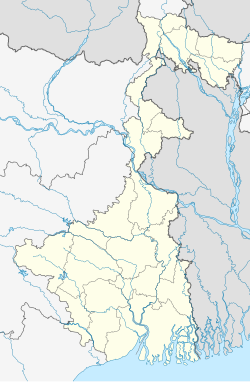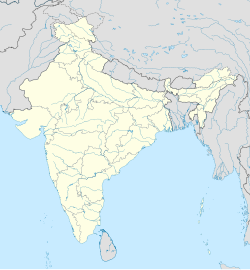Palashipara, is a village in the Tehatta II CD block in Tehatta subdivision of the Nadia district, West Bengal, India.[1]
Palashipara | |
|---|---|
Village | |
 Palasahipara Bus stand | |
| Coordinates: 23°47′0″N 88°27′0″E / 23.78333°N 88.45000°E | |
| Country | |
| State | West Bengal |
| District | Nadia |
| Population (2011) | |
• Total | 10,693 |
| Pin | 741155 |
History
editDuring the time between Maratha invasions of Bengal by Bargis and Battle of Plassey, local people migrated to a different place to avoid social, political turmoil and form a new human settlement. According to the etymology para (locality) of the inhabitants of Palashi (Palashi) set up here.[2] Palashipara is an old village situated in the bank of Jalangi River. An indigo kuthi was established by the indigo planters at Nishchintapur village near Palashipara.[3] Before the Partition of Bengal (1947) this place was under Meherpur subdivision in British India.[4][5]
Geography
edit5miles
River
CT: census town, R: rural/ urban centre.
Owing to space constraints in the small map, the actual locations in a larger map may vary slightly
Location
editPalashipara is located at 23°47′0″N 88°27′0″E / 23.78333°N 88.45000°E.
Area overview
editNadia district is mostly alluvial plains lying to the east of Hooghly River, locally known as Bhagirathi. The alluvial plains are cut across by such distributaries as Jalangi, Churni and Ichhamati. With these rivers getting silted up, floods are a recurring feature.[6] The Tehatta subdivision, presented in the map alongside, is topographically part of the Nadia Plain North. The Jalangi River forms the district/ subdivision border in the north-western part and then flows through the subdivision. The other important rivers are Mathabhanga and Bhairab. The eastern portion forms the boundary with Bangladesh.[7] The subdivision is overwhelmingly rural. 97.15% of the population lives in the rural areas and 2.85% lives in the urban areas.[8]
Note: The map alongside presents some of the notable locations in the subdivision. All places marked in the map are linked in the larger full screen map. All the four subdivisions are presented with maps on the same scale – the size of the maps vary as per the area of the subdivision.
Demographics
editAccording to the 2011 Census of India, Palashipara had a total population of 10,693, of which 5,434 (51%) were males and 5,259 (49%) were females. Population in the age range 0–6 years was 955. The total number of literate persons in Palashipara was 7,911 (81.24% of the population over 6 years).[9]
Civic administration
editPolice station
editPalashipara police station serves Tehatta II subdivision.[10]
CD block HQ
editThe headquarters of Tehatta II CD block are located at Palashipara.[11]
Education
editThere are two high schools at Palashipara. Palashipara Mahatma Gandhi Smriti Vidyapith known as MGS vidyapith is situated here. Another Higher Secondary school Palashipara Mahatma Gandhi Smriti Balika Vidyalaya is the schools for girls', providing 10+2 education to the locals. There are few primary schools in the locality.[12]
Transport
editPalashipara is connected by bus with district headquarters Krishnagar. Nearest Plassey railway station at Plassey is almost 18 km from Palashipara. The connector of National Highway 34 (India) and State highway 11 passed through the village.[citation needed] A bridge named Dwijendralal Setu was made in 1971 over the Jalangi river on the way of the connector.[13]
Palashipara picture gallery
edit-
Dwijendralal Bridge over the Jalangi river, Palashipara
-
Betai-Plassey road at Palashipara
-
Palashipara Mahatma Gandhi Smriti Vidyapith
-
Radhanagar more, Palashipara
References
edit- ^ "মহকুমা ও ব্লক | নদীয়া জেলা, পশ্চিমবঙ্গ সরকার | ভারত" (in Bengali). Retrieved 1 June 2024.
- ^ Shantanu Biswas (2005). Itihaser Prekkhapote Palashiparar Atit Kahini. Palashipara: Anindita Library. p. 18.
- ^ Lokesh Ch Biswas (2016). Tehatta Mahakumar Nilkuthi (Bengali). Chakdah: Monokothan, yearly little magazine. p. 8.
- ^ Kumudnath Mullick (1998). Nadia Kahini (Bengali). Dhaka: Baipatra. p. 276. ISBN 978-984-8116-00-5.
- ^ Industries, Bengal (India) Department of (1929). Report on the Survey of Cottage Industries in Bengal. Bengal Secretariat Book Depot.
- ^ Gangopadhyay, Basudev, Paschimbanga Parichay, 2001, (in Bengali), p. 70, Sishu Sahitya Sansad
- ^ "District Census Handbook, Nadia, 2011, Series 20, Part XII A" (PDF). Pages 13,14. Directorate of Census Operations, West Bengal. Retrieved 15 October 2020.
- ^ "District Statistical Handbook 2014 Nadia". Table 2.2, 2.4(a). Department of Planning and Statistics, Government of West Bengal. Retrieved 15 October 2020.
- ^ "2011 Census – Primary Census Abstract Data Tables". West Bengal – District-wise. Registrar General and Census Commissioner, India. Retrieved 18 May 2017.
- ^ "Nadia Gets Its 22nd Police Station In Palashipara". Retrieved 17 December 2018.
- ^ "District Census Handbook: Nadia, Series 20 Part XII A" (PDF). Map of Nadia with CD Block HQs and Police Stations (on the fourth page). Directorate of Census Operations, West Bengal, 2011. Retrieved 2 May 2017.
- ^ "West Bengal Board of Secondary Education". wbbse.org. Retrieved 19 March 2017.
- ^ "পলাশিপাড়ার সেতু". anandabazar.com. Retrieved 17 December 2018.

